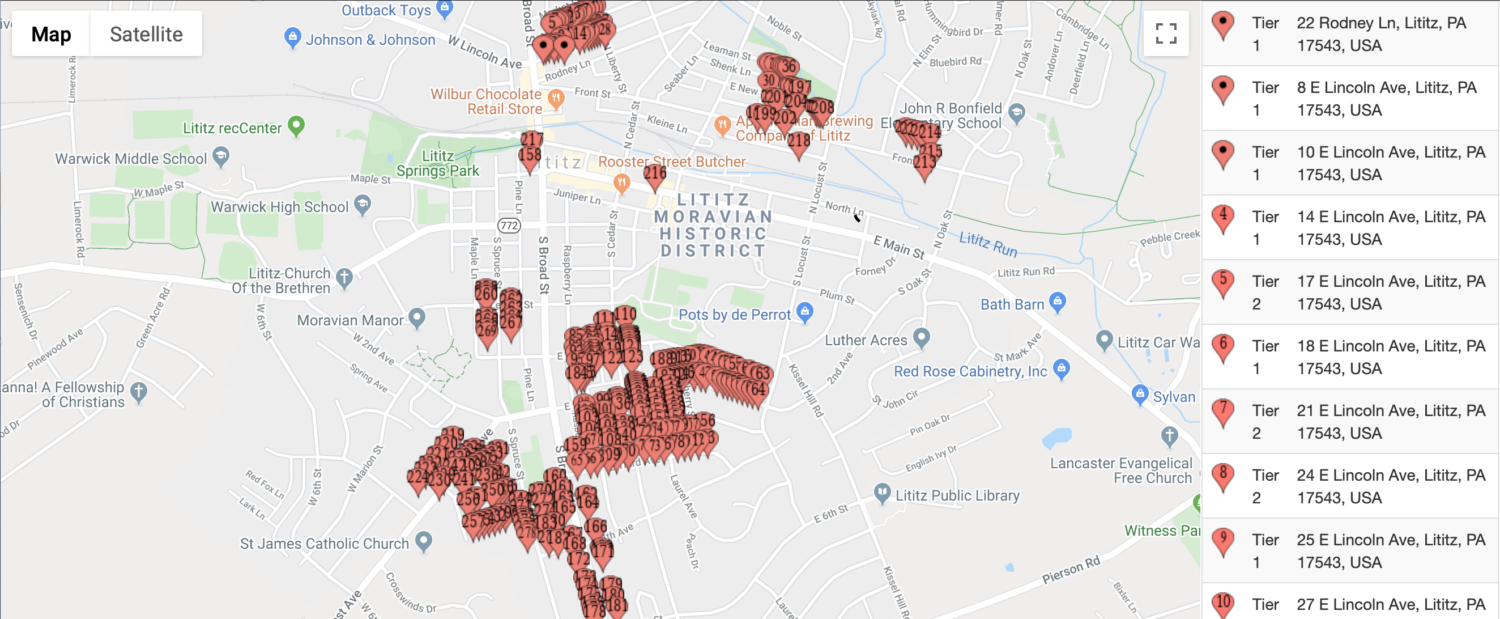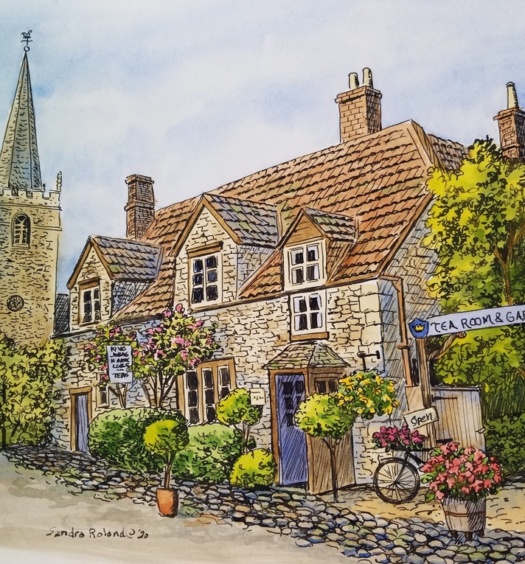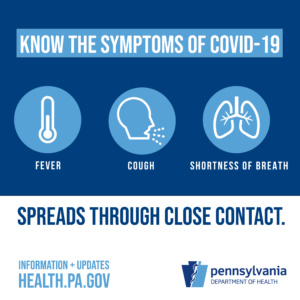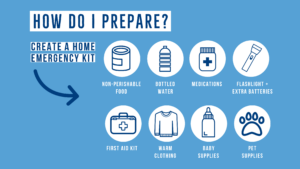Almost 300 Homes Considered at Higher Risk for Lead in Tap Water on the List
IMPORTANT UPDATE: THE FIRST PAGE OF THE LIST WAS OMITTED FROM THIS STORY when it was published on 5/5/16. IT HAS BEEN ADDED AS OF 9 p.m. on 5/5/16. THE LIST PROVIDED BY LITITZ BOROUGH IS FOUR PAGES LONG, AND SHOULD BE REVIEWED IN ITS ENTIRETY SINCE STREETS SPLIT BETWEEN PAGES. The borough intentionally omitted addresses from this list before providing it to LititzDailyNews.com, so it should not be considered a comprehensive list of all properties with a lead gooseneck connector.
Lititz Borough has located over 300 addresses where lead connections known as goosenecks deliver water, according to and email and documents provided by borough manager Sue Barry to LititzDailyNews.com in response to a Right-to-Know Law request. Since some of the sites are not improved, according to Barry, the list below provided by the borough features just under 300 addresses.
RELATED STORY: STATE DATA SHOWS LITITZ-AREA KIDS HAVE HIGHER RATE OF LEAD POISONING THAN FLINT
Homes with lead goosenecks or lead service lines are at higher risk for lead contamination in drinking water. Lead usually leaches from pipes between the water main in the street and the home tap.
CLICK LINK TO ACCESS THE INTERACTIVE LITITZ MAP OF ADDRESSES
The state recently issued a violation to Lititz Borough for failing to identify homes with lead service lines for testing. Lead goosenecks are lead connections. If a home does not appear on this list it still may be at risk for high lead levels in drinking water.
Corrosive water can release the lead from lead pipes, lead connections, and other sources of lead in plumbing. Lititz Borough has been required to treat its water with an anti-corrossion chemicals since high levels of lead were found in the system as early as 1993.
Page 2 of Lititz Borough residences with lead “goose neck” connectors. List continues on page 3.
The Pennsylvania Department of Environmental Protection recently issued a violation to the borough of the law governing testing for lead in drinking water. The state says that Severn Trent Services, a private company that operates the borough water system, failed to identify appropriate lead sampling sites. The borough and Severn Trent claim that they were unable to locate any lead service lines, the pipes that connect individual homes to the water main.
The list shows addresses on multiple streets throughout the borough and assigns a tier classification to each home. The tier
refers to the level of lead contamination risk for each home. All of the addresses listed by the borough are either Tier 1 or Tier 2, representing homes at higher risk for lead in drinking water.
Tier 1 homes are single family homes of any age known to have lead service lines or lead connections, or homes built between 1982-1985 that have copper pipes with lead solder. Tier 2 homes are multi-family dwellings or commercial businesses that may have the same actual level of risk as Tier 1 for lead entering the home, but they are classified as Tier 2 for the purpose of the mandatory water tests.
“Severn Trent did an internet search to determine which sites are Tier 1 and Tier 2,” said Sue Barry in an email to LititzDailyNews.com. “They will confirm Tier designations when updating our plan.”
The borough is required to submit a plan for testing Lititz Borough homes again this summer.
“Lititz should submit a copy of its 2016 Lead and Copper Rule monitoring plan to the department prior to the next sampling period of June 1st through September 30, 2016,” wrote David T. Linton, the state safe drinking water supervisor who issued the violation to the borough.
Consumers should not use hot water for preparing baby formula or cooking, according to the state an CDC. High levels of lead are especially dangerous to formula-fed infants, children, fetuses, pregnant women, and adults. Certain filters at the tap certified to remove lead may be effective for certain lead levels. For more information about reducing the risk of lead in water, visit the Pennsylvania website.
To receive our next stories on lead and lead safety for FREE, email [email protected].
Connecting to Your Government: Sue Barry, Borough Manager Email: [email protected]
Lititz Borough Council meets on May 24th and on the last Tuesday of each month at 7 p.m. in Borough Council Chambers, 7 S. Broad St., Lititz. Public comment is welcome. Council President: Karen Weibel. Vice President: Shane Weaver; Members: Andrew Greiner, Cory Van Brookhoven, Christine Sensenich, Scott Hain. Phone: (717) 626-2044.
STATE RECOMMENDATIONS ON LEAD IN WATER SAFETY
The Pennsylvania Department of Health recommends the following to minimize the risk of exposure to lead in drinking water, since lead exposure in drinking water typically comes from pipes and plumbing fixtures, not the water source:
• Run your water to flush out lead. If water hasn’t been used for several hours, run water for 15-30 seconds or until it becomes cold or reaches a steady temperature before using it for drinking or cooking. This flushes out any stagnant water in your home plumbing and replaces it with fresh water from the water main in your street.
• Use cold water for cooking and preparing baby formula. Do not cook with or drink water from the hot water tap; lead dissolves more easily into hot water. Do not use water from the hot water tap to make baby formula.
• Do not boil water to remove lead. Boiling water will not reduce lead. In fact, lead concentrations will be higher in water that is boiled since some of the water is removed as steam.
• Test your water for lead. Contact your water system for more information about getting your water tested. Some water systems may offer to test your water free of charge. Your water system can also provide information about local laboratories that conduct lead testing. If you’re a private well water user, you should contact a DEP-accredited lab for information about water testing. Here is the link to a listing of DEP-accredited labs.
• Identify whether your your house’s plumbing fixtures contain lead. There are lead check swabs that can detect lead on plumbing surfaces such as solder and pipes. These swabs can be purchased at plumbing and home improvement stores.
For more information, visit the Pennsylvania Department of Health LEAD IN DRINKING WATER page and the Lead Poisoning page or call the Department of Health toll-free Lead Information Line at 1-800-440-LEAD. To learn more about identifying lead risks in your home, or in other places your child plays, read the EPA Fact Sheet on Identifying lead hazards.














